#kyousougiga
Explore tagged Tumblr posts
Text
Mental Illness in Anime
I saw someone say Komi Can't Communicate is the only anime they've ever seen that talks about mental illness and that's kinda sad, so for you to not end in the same boat, I've decided to put together an overview of mental illness in anime, what I'd recommend, what comes with caveats, and so on.
It's a little nebulous what "talks about mental illness" means as lots of anime depict characters who are very obviously depressed, traumatized and even suicidal (suicide will be mentioned a lot in this list, so watch out for that), but don't directly name mental illness. It is very stigmatized in Japan, even moreso than many other countries, you don't see much talk about therapy and so on.
However, naturally there are many Japanese people who are mental health advocates, and I found an interview with Makoto Kageyama, a mental health awareness advocate who volunteered at Aokigahara forest. He points out anime he feels deal with mental illness. One we'll cover fully, many of them I haven't watched:
I think the most accurate and positive portrayals I got were actually from Kiriyama Rei (March Comes in Like a Lion), Naruse Jun (The Anthem of the Heart), Miyamura Miyako (ef: A Tale of Memories), Takeya Yuki (School-Live!) and Smile (Ping Pong: The Animation)
I'm super open to suggestions for additions, and might be adding them as reblogs and under the cut.
I'll also be making a post on mental illness in manga if this post does well, which I will link here when I post it.
So I'll start:
Anime that directly discusses mental illness:
March Comes in Like a Lion- not only is the main character one of the most accurate depictions of depression I've ever seen, it's the rare anime that actually talks about counseling, showing a traumatized character attending counseling and slowly getting back on her feet.
Orange--it...certainly is about mental illness, but it's a pretty mixed/problematic one because it seems to be confused by how mental illness works at times. It centers around a character who's suicidally depressed and his friend's efforts to save him after receiving a time travel message about his future suicide. It also does mention offhand that this character was supposed to go to therapy and is skipping out at one point. But yeah, how it handles it is...not always great. It kind of gives an impression that if you try hard enough you can "fix" someone's suicidal depression. With friendship. I guess. You have been warned.
I haven't watched it in a really long time, so it might even be worse than I remember. But I'm including it bc I definitely cried and felt parts of it were very relatable when I saw it way back when. so there's some resonant stuff there.
Monster: Kind of mixed, but it's definitely notable as an anime that not only has a psychiatrist as a major character, but also shows prominent characters going to therapy and getting better. Characters go to him for alcoholism, depression, PTSD (PTSD is not named but yeah it's definitely PTSD). At one point he helps a main character recover some repressed traumatic memories.
What makes it mixed is that while several heroes definitely are mentally ill in some way, the (complex) antagonist of the series also has some sort of mental health condition , and the story is often weirdly muddled about it. At one point they make it out like he has Dissociative Identity Disorder (calling it "split personality") but then he never shows any symptoms of that and it's kind of dropped and not bought up again. He does definitely have repressed traumatic memories though, so maybe that's all they were getting at but said it very badly.
A heroic character that actually seems to have Dissociative Identity Disorder and YMMV in how it's handled and how accurate it is. It's a "the other personality is violent" one, but rather than the other personality being evil, it's. a defense mechanism, and the violence is always in self defense or defense of others..
Sort of names the problem:
My New Boss is Goofy: One of the main characters is recovering from an abusive boss, and definitely has anxiety attacks and flashbacks as a result. This is directly named as "trauma" (though much like in the West where the loan word came from, anime characters use the words to refer to minor things that aren't mental illness too. But in this case it's treated very seriously). At any rate, the entire anime is about others helping the MC slowly recover with his new boss and friends showing immense compassion for his anxiety and other problems. Here's a good article going into it!
Anime that focuses on social anxiety:
I think what stands out about Komi is that it directly says she has a communication disorder, but tons of anime focus on characters with social anxiety, and even state what the problem is directly.
Bocchi the Rock- The girl with the social anxiety is the main character and not the bland self insert guy who has a crush on her?, amazing. it lets her be a mess too? whaaat. Yeah, Bocchi does say directly she has severe social anxiety, and the series is very relatable in how it explores that. There are a lot of gags about it, but in a knowing, sympathetic way. Her recovery is realistically slow, and sometimes she backslides. She talks directly about her social anxiety, using the term.
Tsuritama: MC's social anxiety is so bad he can have panic attacks when people talk to him...the attacks are also represented in this really interesting way where they have water come in to drown him.
My Roommate is a Cat: Man dealing with social anxiety slowly recovers with the help of his cat. It's cute. Here's an article going into it!
Anime that don't namedrop mental illness directly, but really resonates:
Natsume's Book of Friends: I wrote an entire article about how relatable it is to me and my mental illness, how it uses the characters seeing yokai as metaphor for mental ilness at times (Natsume was textually mistreated by so-called guardians who thought he "wasn't right in the head" and his grandmother was often called that too) but also Natsume shows a lot of textual symptoms of trauma (possibly PTSD), depression and so on, and they're explored very poignantly. Here is my article: “The Courage to Speak”: Mental illness and recovery in Natsume’s Book of Friends
Revolutionary Girl Utena: Probably one of the most poignant explorations of what it means to be depressed and traumatized as a teenage girl. Several moments with Utena herself resonate, starting with when she was a child and declares she doesn't want to go on living, Anthy is also...dealing with a lot, and it's powerful how the show goes into it.
Neon Genesis Evangelion-- Many characters in it show symptoms of mental illness. Though it isn't named as depression directly (i think?), but Shinji shows every symptom you can think of, and the director Anno has said that he was extremely depressed while making it and channeled a lot of that into the characters, and we definitely see his mental journey for the better very strongly reflected in the reboot.
Kyousougiga: One of the main characters is suicidally depressed (this one is graphic, because he commits suicide on screen...only it turns out he can't die), and his journey towards becoming okay with living is a focus and was very resonant to me.
She and Her Cat: A short anime about a girl who definitely has depression and how her cat helps her. Rather simplistic ending but it's good otherwise. CW animal death too, but in a very gentle way.
Haibane Renmei: It deals with suicidal depression and other mental health struggles in a pretty intense way, it's touching, but if you have triggers consider looking into it.
Fruits Basket: Truly a cocktail of mental illnesses among the cast. YMMV on how it's handled but some parts really resonate. These articles go into it:
The Always Smiling Girl: How Tohru critiques toxic positivity
“A Man Who Can Experience His Feelings”: Fruits Basket, toxic masculinity, and mental health
Colorful: This is a submission from Nickyenchilada from the notes of this post: "I would also recommend the movie/novel Colorful. I think YMMV on how it handles the central issue of suicide but I think it does portray how even kids can be thrust into very complex situations without necessary outlets for coping with them."
Vinland Saga: This was an addition I got from a discord conversation, the entire second season explore the main character's PTSD
Yuri on Ice- A conversation on discord reminded me that a lot of people read Yuri as having an anxiety disorder, which I can totally see!
A Silent Voice- a submission from @boku-no-anime-phase who says: "I think it deserves its own shout out! This movie is nuanced, gentle, beautifully told and brimming with hope. I love the fact that just like in real life, things don't resolve particularly easily; but the characters make important progress that's rewarding to watch. TW for suicide discussion, ideation and attempt".
Rascal Does Not Dream of Bunny Girl Senpai - From boku-no-anime-phase who says: "YMMV but there's an arc that deals with bullying and memory loss where a character who deals with those things is supported and encouraged through it".
My Happy Marriage - From boku-no-anime-phase who says: "also YMMV but I think there were some lovely moments in this where you can see Miyo beginning to heal from her trauma and abuse, and learn to trust."
Anime Feminist has a whole host of articles on mental health in anime and they're all here. It covers a lot of different anime I don't know about or didn't mention and offers a lot of cool perspectives, so check 'em out! Here's a few that stuck out to me:
Finding Inner Magic: Depression in The Ancient Magus’ Bride
(I don't like this anime's narrative due to the issue with the ending pointed out in this article, but it did have resonant moments of exploring depression).
How Clean Freak! Aoyama-kun compassionately handles mental illness
The Sound of Depression: Liminal spaces, sound design, and Super Cub
From Yandere Girlfriends to Social Anxiety: Handling mental illness in The Future Diary and A Silent Voice
Footnote on Hikikomori in anime:
Any anime that focuses on Hikikomori characters are dealing with characters that are mentally ill, as being so depressed/traumatized/agoraphobic/anxious you can't even leave your room or house is obviously not mentally healthy. But what really matters is how that’s handled and if these issues are explained, as Makoto Kageyama notes:
Usually, the most common issues I’ve seen covered is the “hikikomori phenomena” and light eating disorders. Basically, a bullied character that becomes a recluse out of social anxiety, but… The characters don’t usually get shown correctly, since their issues are not explained properly and basically it ends up with a “Hey, see? People are not that bad, we are your friends!” and “Yay, I have friends, I am cured and I can trust others again!” Which is not the case, because real hikikomori can take a lot of talk and patience to get them out and when they get back to normal society (if they do), they become very wary of others. And ironically, “hikikomori” has also been used as a “moe trait” in anime even though it’s a mental health issue.
One I saw a lot of people namedrop as handling it well when I googled around was Welcome to the NHK, though I haven't seen it. But, if you look at Nickyenchilada's take in the comments to this post, it's mentioned as being resonant and it's noted that the recovery is not an easy fix, and it's also noted that several characters in the story are mentally ill.
Bonus list:
Neurodiversity in Anime- (that don't namedrop mental illness directly, but really resonate)
I initially didn't include a neurodiversity section in this post because I honestly could not think of any anime that directly talks about neurodiversity or has a textually neurodivergent character.
(However, there are manga that actually do! I pointed some out in my Mental Illness and Neurodiversity in Manga post I did to complement this one!)
You can also read some articles about neurodiversity in anime here
And the list of characters that can simply be read as neurodivergent is huge, and if I tried to list every popular read it would be endless, plus I don't feel comfortable "diagnosing" any characters with developmental disorders I don't personally have. However, I am willing to take suggestions from others on this one, so here are a few!
Mob Psycho 100 - submitted by boku-no-anime-phase, who says " Mob is autistic and I will die on this hill; the trouble he has with fitting in, relating to others and knowing the right things to do imo stems directly from that."
Princess Jellyfish - submitted by boku-no-anime-phase, who says "I'd be willing to bet that all the women who live in that apartment are neurodivergent. They all have their special interests and they live together in mutual neurodivergent infodumping bliss and it's wonderful. (Unrelated but TW for sexual assault and some transphobia)"
Chihayafuru- submission by @noisepartythumpingmusic who says "It's never noted explicitly, but I firmly believe the main character of Chihayafuru has ADHD, which is perfect for a main character of a sports" josei. As someone who does have ADHD, I personally can totally see that read of Chihaya (the main character)!
Anti-recommendations (as in seems potentially resonant but then drop the ball hard, because if I listed all the anime that's blatantly gross about mental illness from the second the subject comes up we'd be here all day) (Dead Dove Do Not Eat)
Wonder Egg Priority: Starts out like it's going to be a nuanced exploration of recovering from abuse, suicidal depression, and so on, only to end up incredibly stupid and offensive. The writer also believes some stupid and misogynist things about "reasons" girls commit suicide. This article goes into it a little.
Your Lie In April: Depiction of depression and trauma is completely undermined by how all the characters tell the MC he needs to get over it because his talent for piano is more important, and the clumsy, gross take on forgiving your abuser, and so many other things. This article goes into it.
---
And that's it for now! Again. I might be updating this with new stuff based on feedback or me remembering something I missed, through both updates and adding stuff under the cut.
#mental illness#mental health#march comes in like a lion#anime#sangatsu no lion#orange anime#naoki urasawa's monster#monster#my new boss is goofy#bocchi the rock!#bocchi the rock#my roommate is a cat#revolutionary girl utena#neon genesis evangelion#natsume's book of friends#natsume yuujinchou#kyousougiga#haibane renmei#tsuritama#vinland saga#yuri on ice
398 notes
·
View notes
Text

finding communalities between my favorite anime. here’s my niche
#i made this for my wife and she loved it and told me to post this lmao#it’s ugly but im not remaking it lol#the shows are (in order):#madoka magica#revolutionary girl utena#princess tutu#revue starlight#kyousougiga#flip flappers#mine
38 notes
·
View notes
Text
"Who's Hotter?" Anime Momma Battle
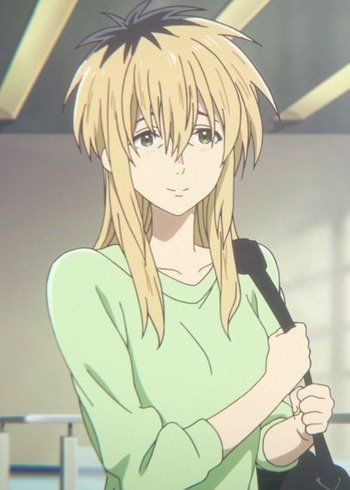

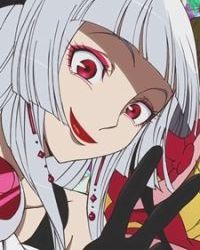
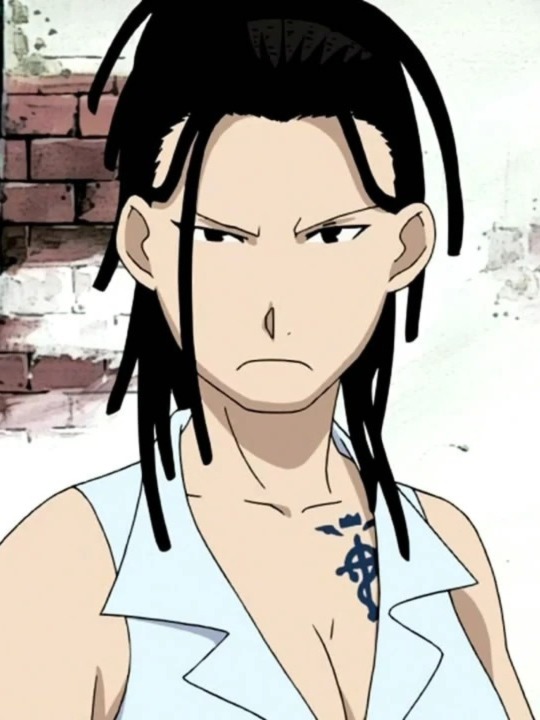
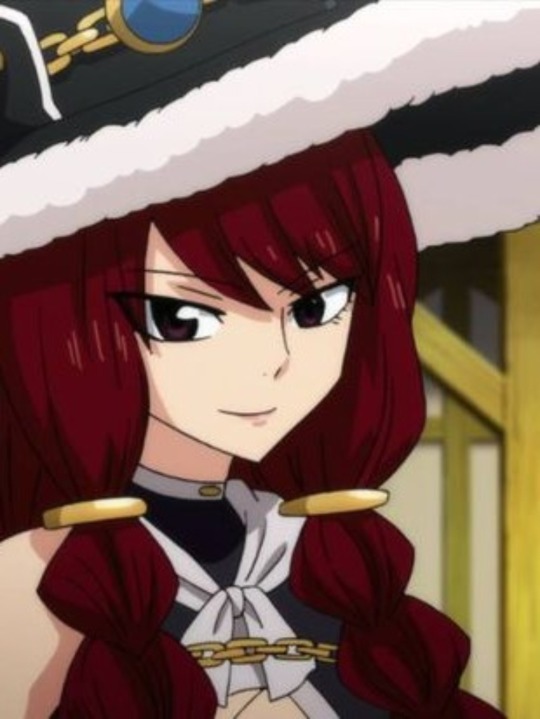
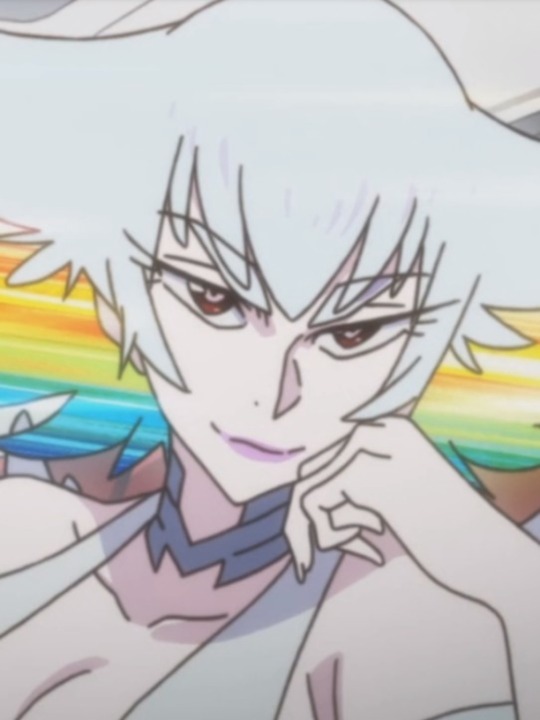
#miyako ishida#a silent voice#ruka rengoku#demon slayer#kimetsu no yaiba#koto otona#kyousougiga#izumi curtis#fullmetal alchemist brotherhood#fullmetal alchemist#irene belserion#fairy tail#ragyo kiryuin#kill la kill#anime#anime poll#polls#whoishotteranimepolls
68 notes
·
View notes
Text



Kyousou Giga (2013)
26 notes
·
View notes
Text

Kotooooooooooo (alt colors under cut)

68 notes
·
View notes
Text
Obscure Anime of The Day:
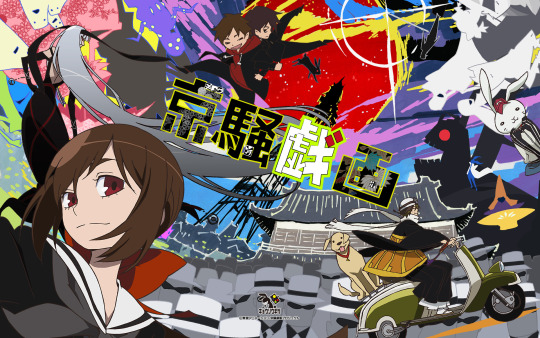
Kyousougiga
Aired: 2013
Genres: Action, Comedy, Fantasy, Supernatural
115 notes
·
View notes
Text
⚠️Vote for whomever YOU DO NOT KNOW⚠️‼️


5 notes
·
View notes
Text
Alice 30 Day Challenge
Day 25: Favorite Alice-inspired moment in pop culture (e.g., Follow the White Rabbit” in The Matrix, music inspired by Alice, ect.)

I’d probably have to go with Kyousougiga, a 2013 anime series that draws a lot of inspiration from Alice’s Adventures Through the Looking Glass.

The show includes an excerpt from “A Boat Beneath a Sunny Sky,” and the fictional version of Kyoto that serves as the show’s setting is also known as the “City Beyond the Looking Glass.” A rabbit plays a key role in the show, although it’s black instead of white.

On that note, I highly recommend this series; it’s so visually gorgeous and filled with really heavy themes. At it’s heart, it’s a heartwarming family drama with a colorful cast of characters. The best way to watch it is via Discotek Media’s Blu-Ray release with better subtitles than the version on Crunchyroll.

7 notes
·
View notes
Text
[Trope Interest] Twin Bodyguards and Their Hunter Sister in Supernatural Works

Source: Promotional/Cover Art for Kyousougiga, Jiu Jiu, and Trese
By: Peggy Sue Wood | @pswediting
For some time, I’ve been fascinated by the trope of twin bodyguards who can shapeshift from humans to dog forms and their accompanying female “hunter” character. I find it interesting that this trope appears with enough frequency to be noticeable, yet it lacks a specific name, unlike “Single-Mind Twins” or “Tag Team Twins.” There are several examples of this trope. To name a few examples, Kyousougiga (Japanese) features the character Koto being followed around by her “brothers,” A and Un; Jiu Jiu (Japanese) has Takamichi followed by her shape-shifting, half-demon wolf-dog familiars, Snow and Night; and Trese (Filipino) has Alexandra with her adopted brothers, Crispin and Basilio.
Upon further review, I think that the trope of twin sidekicks/bodyguards and female hunters in supernatural comics and animation likely draws from various sources of inspiration and cultural mythology. One possible influence is the traditional Japanese folklore of “Inugami,” or “dog spirit.” Inugami were said to be the spirits of dogs that were killed by humans and were often summoned and used for various purposes, including protection, curses, and revenge. In some stories, Inugami could take on human form and even possess humans and other animals. Interestingly, these spirits could become attached to bloodlines, following a family through their descendants.
Another possible influence is the Japanese mythology of Komainu, lion-dogs that guard the entrances of Shinto temples/shrines, or the Shisa, which serve a similar purpose. Both of these seem to have derived from the Chinese (or Imperial) guardian lions, which symbolize protection (one physical and one metaphysical). Either way, around the world and over time, dog spirits have often been portrayed as both guardians and harbingers.
While I’ve come to understand, at least in part, the dog-twins potential origins, I still struggle to understand or find a related myth to a singular female hunter-type character. There is Artemis, the famous greek/roman myth character who is goddess of the hunt, but her image and story rarely overlap with the hunter characters seen in works that have this two+one combination. Moreover, the close emotional bond that the three tend to share in the stories–often portrayed with familial-nature (adopted siblings with no romantic interests)–seems to be a significant factor in the continued use of this trope. Continuing in our prior examples, Koto is searching for the black rabbit/her mother; Takamichi is hunting demons, and Alexandra is after monsters.
The twin sidekicks are always depicted as “protectors” or “guardians” to a female lead, often with her occupying an adopted sister role rather than existing as a love interest. They are portrayed as loyal, fierce, and powerful, with the ability to transform into large, intimidating dog-like creatures to defend their master. Overall, the dog servants are depicted as essential members of the hunting team and play a significant role in the story.
Of course, the influences behind Kyousougiga, Jiu Jiu, and Trese may have come from other supernatural comics and anime that have used similar tropes in the past. They may also have combined these cultural sources with their own stories to create a unique take. Regardless, it is an interesting trope to examine, and I continue to wonder about its specific origins.
If you have any ideas about the specific source(s) for this trope, I hope you will share them with me in a comment or message as I really do not know and am very interested to learn about this idea. Thank you for reading!
79 notes
·
View notes
Text

Koto from Kyousougiga!!
Had hella fun when I made this and loved the anime it was so much fun!
Though, I wish it was easier to understand and had more to it, but I still enjoyed my watch!
15 notes
·
View notes
Text
It's 5:40am, I'm currently so tired that I've gone full circle and now have energy again ✌🏾soooo...
Today's gender is voiced by Colleen Clinkenbeard and animated by Toei Animation

(^^ If you actually know the show in this gif I am platonically in love with you)





#i know icarus isn't in dbz kai but gohan looks adorable in this gif#gender#genderqueer#anime#animation#voice acting#voice actors#animated by#voiced by#gender of the day#toei animation#colleen clinkenbeard#kyousougiga#toriko#mononoke 2007#koto kyousougiga#mononoke kusuriuri#kusuriuri#monkey d. luffy#straw hat luffy#one piece#marie mjolnir#soul eater#son gohan#dbz gohan#dbz kai#dragon ball z
17 notes
·
View notes
Text
i was listening to the code vein ost and i was like "....hey i know that melody."
its just fucking koysougiga
30 notes
·
View notes
Text
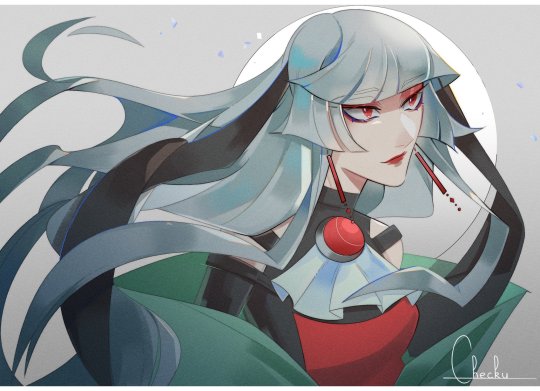
Lady Koto
#my art#fanart#kyousougiga#lady koto#anime#i just rewatched it#Koto is ao pretty i am crying#just a 10/10 show#the visuals are so stunning
105 notes
·
View notes
Text


12 notes
·
View notes

